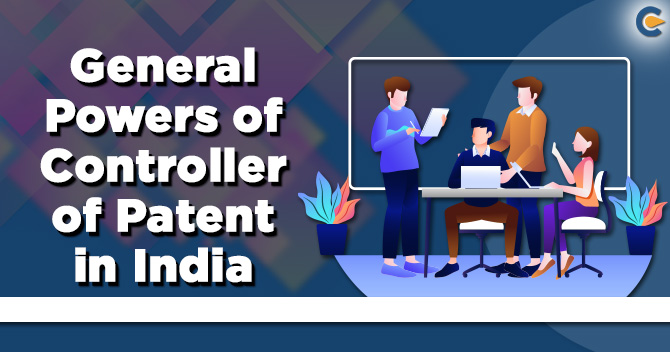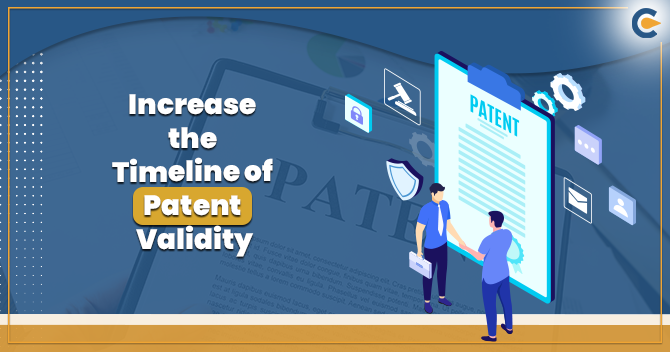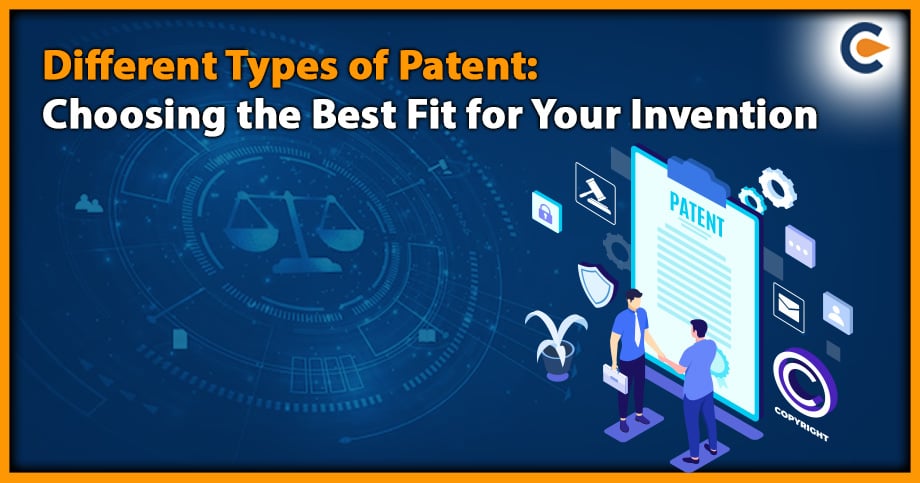The General Powers of Controller of Patent in India are prescribed under the Patent Act, 1970, and the Patent Rules, 2003. The Controller of Patent under the provisions prescribed under the Patent Act, 1970 and Patent Rules, 2003, has to accordingly work and comply with the norms specified. The main officer responsible for the administration of the Patent system in India is the Controller of Patent appointed under the Patent Act, 1970. The General Powers of Controller of Patent is kept wide to ensure the best delivery of services to the common people applying for Patent Registration in India. In this article, we will discuss the General Powers of Controller of Patent in India in detail.
What is the meaning of Controller under the Patent Act, 1970?
Controller referred to Section 73(1) of the Act means the Controller General of Patents, Designs and Trademarks. The Government appoints the as per Section 3 of the Trademarks Act, 1999, the Controller General of Patents, Designs and Trademarks is appointed. The person so appointed under the Trademarks Act, 1999, by the Government will be the Controller of Patents for the purposes of the Patents Act, 1970. The Central Government is also authorized to appoint examiners and other required officers with designations as the government deems fit. The officers so appointed by the Central Government should discharge their duties, under the directions and superintendence and of the Controller General of Patents, Designs and Trademarks, and such functions of the Controller of Patent under the Patent Act, 1970, as he/she may authorize in writing from time to time, by special or general order.
What are the General Powers of Controller of Patent under the Patent Act, 1970?
The General Powers of Controller of Patent under the Patents Act, 1970 are as follows:


Certain Powers of Civil Court to Controllers
The Controller of Patent, in any proceedings before him/her under Section 77 of the Patents Act, 1970 and Rule 136 of the Patent Rules, 2003, have the exclusive powers of a Civil Court while trying any suit under the Code of Civil Procedure, 1908 (CPC) (Act No. 5 of 1908). The matters in which the Controller has the power of a civil court are as follows:
- Enforcing and Summoning the attendance of any person and examining him/her on oath;
- Demanding the production and discovery of any document;
- Getting certain evidences on affidavits;
- Issue of commissions for examining of witnesses of documents;
- Awarding of costs;
- Reviewing and Revising his/her own decision on application made by any person within the prescribed time period and in the manner prescribed;
- Setting aside of an ex-parte order on application made within the prescribed time period and in the manner prescribed;
- Any other important matter which is prescribed.
Awarding Costs
- Under Section 77(1)(e) of the Patent Act, 1970, and Rule 63 and 136 of the Patent Rules, 2003, the Powers of Controller of Patent includes Awarding of Costs.
- Any order by the Controller of Patent of Awarding of costs in exercise of the general powers conferred upon him/her will be executable as a decree of a civil court. The costs will be awarded by the Controller of Patent, in all the civil proceedings before him/her, as he/she considers being reasonable, having a reference to all the circumstances and situations of the case.
- However, the amount of costs awarded by the Controller of Patent in respect of any matter set out in the Fourth Schedule should not exceed the specified amount therein.
- The Controller of Patent can, in his/her own discretion, award any amount of compensatory cost in any civil proceeding before him/her which in his/her opinion is vexatious or false.
Review
- The Controller of Patent under Section 77(1)(f) of the Patent Act, 1970, and Rule 130 of the Patent Rules, 2003, includes Review as the General Powers of Controller of Patent in India.
- The Review is filed as prescribed in Form-4, 24.
- Section 114 & Order XLVII of CPC, 1908 are also associated with the General Powers of Controller of Patent of reviewing.
- Any person seeing himself/herself to be aggrieved by any decree or order of the Controller of Patent from which an appeal is allowed but no appeal is preferred, or no appeal is allowed, and who, from the discovery of important or new evidence or matter which, after the exercise of due diligence was not within his/her information or was not able to produce at the time when the decree or order was passed or an order was made, or on account of some error or mistake apparent on the face of any record or for any other satisfactory reason, desires to get a review of the decree passed or an order made against him/her, may apply for a review of the decree or order to the Controller of Patent.
- An application to the Controller of Patent for the review of his/her decision under Section 77 (1)(f) of the Patent Act, 1970, should be made within a time period of one month from the date of communication of such decision to the applicant or within any such further time period which should not be exceeding one month subsequently as the Controller of Patent may allow on a request.
- An application for review by the applicant should be accompanied by a statement setting out the reasonable grounds on which the review is required.
- Where the decision in question involves any other person in addition to the applicant, the Controller of Patent should immediately transmit to the other person a copy of each of the application and the statement.
- An application to the Controller of Patent for setting aside an ex-order passed by him/her under Section 77 (1)(g) of the Patent Act, 1970, should be made within a time period of one month from the date of communication of such an order to the applicant or within such further time period which should not be exceeding one month as the Controller of Patent may allow on a request and should be accompanied by a statement setting out the reasonable grounds on which the application of the applicant is based.
- Where the order of the Controller of Patent also concerns any other person in addition to the applicant of the application, the Controller of Patent should immediately transmit a copy of each of the application and the statement to the other concerned person.
Petition for Obviating and Irregularity
- Under Rule 137 of the Patent Rules, 2003, the Controller of Patent has the power to amend and obviate any irregularity in any document.
- The case law related to Rule 37 of the Patent Rules, 2003, is the Nippon Steel Corporation vs. Union of India.
- Any document for which no special provision or amendment is made in the Patent Act, 1970, can be amended and any irregularity in the procedure which in the opinion of the Controller of Patent can be obviated without any damage to the interests of any person, should be corrected by the Controller of Patent if he/she thinks fit and upon any such terms as he may direct.
Read our article:Different Types of Patent Applications in India
Mention of Inventor in Patent
- Under Section 28 of the Patent Act, 1970, and Rules 57 to 63 and 66 to 70 of the Patent Rules, 2003.
- The Controller of Patent if is satisfied, upon a claim or request made in accordance with the provisions of the above-mentioned Section that:
- The person in respect of or by whom the claim or request is made is the inventor of an invention in regard of which an application for Patent has been made, or of a substantial part of that invention; and
- The application for the Patent is a direct significance of his/her being the inventor of an invention, the Controller of Patent should, subject to the provisions of the Section mentioned above, cause him/her to be mentioned as the inventor of an invention in any Patent granted in pursuance of the application for grant of Patent in the complete specification and in the Register of Patents:
- Such a claim or request should be accompanied by a statement setting forth the conditions under which the request or claim is made.
- However, the mention of any person as inventor under this section shall not confer or derogate from any rights under the patent.
- A request made by any person mentioned above should be made in the manner prescribed by the applicant of the application for the Patent or (where the person supposed to be the inventor of the invention is not the applicant of the application for grant of Patent or one of the applicants) by the applicant of the application and that person.
Directions Not Otherwise Prescribed
- Under Rule 128 of the Patent Rules, 2003, the Controller of Patent has some directions which are not otherwise prescribed under the Patent Act, 1970, and the Patent Rules, 2003.
- Where for the proper completion or prosecution of any civil proceedings under the Patent Act, 1970 or the Patent Rules, 2003, the Controller of Patent is of the opinion that it is very essential for a party to such proceedings to perform an act, to file a document required and produce required evidence, for which provides no special provisions has been made in the Patent Act, 1970 or the Patent Rules, 2003. The Controller of Patent can, by notice in writing, require any such party to perform all the required act, and to file the document and produce the required evidence specified in such written notice.
- Where a party or an applicant to a civil proceeding desires or requests to be heard or not heard, the Controller of Patent can, at any time period, require him/her to submit his statement in writing giving all such information required by the Controller of Patent as necessary within the time period prescribed by the Controller of Patent.
Exercise of Discretionary Power by the Controller
- Under Section 80 of the Patent Act, 1970 and Rule 129, 129A of the Patent Rules, 2003, the General Powers of Controller with regard to exercise of discretionary power by the Controller of Patent is provided.
- The Controller of Patent should give a chance of being heard to the party, before acting adverse to such a party. The discretionary powers shall be exercised by the Controller of Patent with caution and due care and not in a manner which is arbitrary. Such reasons as provided by the applicant should be taken judiciously or cautiously and all such reasons should be recorded in the file by the Controller of Patent.
- Any party desiring a hearing should make the application for request for such a hearing to the Controller of Patent at least 10 days in advance of the expiry of the time period prescribed with regard to the civil proceeding.
- Before exercising any discretionary power under the Patent Act, 1970 or the Patent Rules, 2003, which is likely to affect a party to a proceeding or an applicant for a Patent unfavorably, the Controller of Patent should give such a party or applicant, a hearing, after giving him/her or them, 10 days’ notice of such a hearing ordinarily.
- A party to a proceeding or an applicant for Patent can make a request for adjournment of the hearing with stating a reasonable cause along with the prescribed fee that is specified in the First Schedule, at least 3 days before the date of hearing of request for adjournment by the Controller of Patent.
- The Controller of Patent, if he/she thinks fit to do so, and upon any terms as he/she may direct, can adjourn the hearing not more than twice and accordingly intimate the concerned parties. Each adjournment order passed by the Controller of Patent shall not be for more than 30 days.
Power of Controller to Correct Clerical Errors
- Under Section 78 of the Patent Act, 1970, and Rule 122 and 124 of the Patent Rules, 2003 the General Powers of Controller of Patent to correct clerical errors is provided.
- Without prejudice to the provisions contained in Sections 57 and 59 of the Patent Act, 1970, as regards to applications of amendment for Patents or complete specifications of Patent or any other documents relating to it and subject to the provisions prescribed under Section 44 of the Patent Act, 1970, the Controller of Patent can, in accordance with the provisions of the above-mentioned section, correct any clerical error in any application of Patent or in any provisional.
- He can complete specification of the Patent or any other document filed in pursuance of such application of Patent or in any application for a Patent or any clerical error in any subject matter which is entered in the register of Patents.
- A correction of the error can be made in pursuance of the Section referred above either upon a request made by any person in writing interested and should be accompanied by the fees prescribed, or without any such request.
- Where the Controller of Patent suggests to make any such correction in error as mentioned above otherwise than in pursuance of a request, he/she is required to give a notice of the proposal to the applicant or the patentee for the Patent, as the case may be, and to any other person concerned, and shall give them an opportunity to be heard before making the correction.
Conclusion
The provisions related to the General Powers of Controller of Patent are provided under the Patent Act, 1970, and the Patent Rules, 2003. The main person responsible for the administration of the Patent system in India is the Controller of Patent. The responsibility to resolve any issue related to a Patent is of the Controller of Patent. The Powers of Controller of Patent is kept wide to ensure the successful resolution of the difficulties of the common people coming for Registration of Patent in India. In India now people are more concerned and curious to get their invention patented as soon as possible and avoid Infringement of their invention. We at Corpbiz have experienced professionals to help you in the process of Registration of Patent in India. Our trained professional will assist and guide you throughout the procedure of Registration of Patent. Our professional will ensure the effective and timely completion of your work.
Read our article: US, EU and Indian Patent Laws: A Comparative Study











